unit2 L11
- 格式:ppt
- 大小:1.49 MB
- 文档页数:15
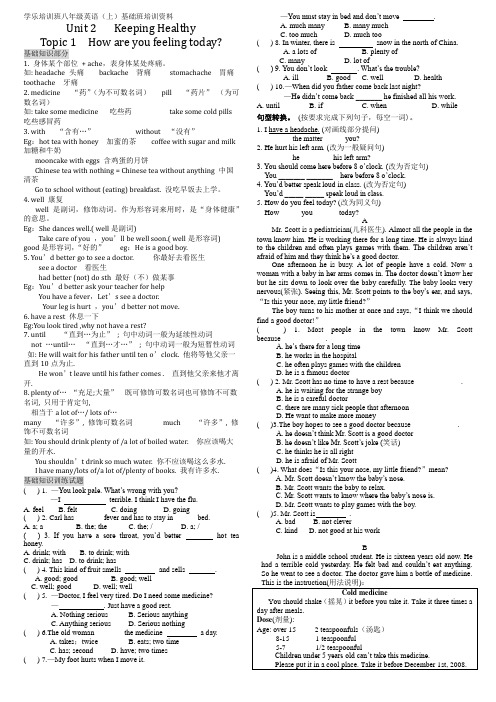
学乐培训班八年级英语(上)基础班培训资料Unit 2 Keeping HealthyTopic 1 How are you feeling today?基础知识部分1. 身体某个部位+ ache,表身体某处疼痛。
如: headache 头痛backache 背痛stomachache 胃痛toothache 牙痛2. medicine “药”(为不可数名词)pill “药片”(为可数名词)如: take some medicine 吃些药take some cold pills吃些感冒药3. with “含有…”without “没有”Eg:hot tea with honey 加蜜的茶coffee with sugar and milk 加糖和牛奶mooncake with eggs 含鸡蛋的月饼Chinese tea with nothing = Chinese tea without anything 中国清茶Go to school without (eating) breakfast. 没吃早饭去上学。
4. well 康复well 是副词,修饰动词。
作为形容词来用时,是“身体健康”的意思。
Eg:She dances well.( well是副词)Take care of you ,you’ll be well soon.( well是形容词) good是形容词,“好的”eg:He is a good boy.5. Y ou’d better go to see a doctor. 你最好去看医生see a doctor 看医生had better (not) do sth 最好(不)做某事Eg:You’d better ask your teacher for helpY ou have a fever,Let’s see a doctor.Y our leg is hurt ,you’d better not move.6. have a rest 休息一下Eg:Y ou look tired ,why not have a rest?7. until “直到…为止”; 句中动词一般为延续性动词not …until…“直到…才…”; 句中动词一般为短暂性动词如: He will wait for his father until ten o’clock. 他将等他父亲一直到10点为止.He won’t leave until his father comes . 直到他父亲来他才离开.8. plenty of…“充足;大量”既可修饰可数名词也可修饰不可数名词, 只用于肯定句,相当于a lot of…/ lots of…many “许多”, 修饰可数名词much “许多”, 修饰不可数名词如: You should drink plenty of /a lot of boiled water. 你应该喝大量的开水.You shouldn’t drink so much water. 你不应该喝这么多水.I have many/lots of/a lot of/plenty of books. 我有许多水.基础知识训练试题( ) 1. —You look pale. What’s wrong with you?—I terrible. I think I have the flu.A. feelB. feltC. doingD. going( ) 2. Carl has _______ fever and has to stay in______ bed.A. a; aB. the; theC. the; /D. a; /( ) 3. If you have a sore throat, you’d better hot tea honey.A. drink; withB. to drink; withC. drink; hasD. to drink; has( ) 4. This kind of fruit smells and sells .A. good; goodB. good; wellC. well; goodD. well; well( ) 5. —Doctor, I feel very tired. Do I need some medicine?—. Just have a good rest.A. Nothing seriousB. Serious anythingC. Anything seriousD. Serious nothing( ) 6.The old woman _______ the medicine a day.A. takes;twiceB. eats; two timeC. has; secondD. have; two times( ) 7.—My foot hurts when I move it.—You must stay in bed and don’t move .A. much manyB. many muchC. too muchD. much too( ) 8. In winter, there is snow in the north of China.A. a lots ofB. plenty ofC. manyD. lot of( ) 9. You don’t look . What’s the trouble?A. illB. goodC. wellD. health( ) 10.—When did you father come back last night?—He didn’t come back _______ he finished all his work.A. untilB. ifC. whenD. while句型转换。
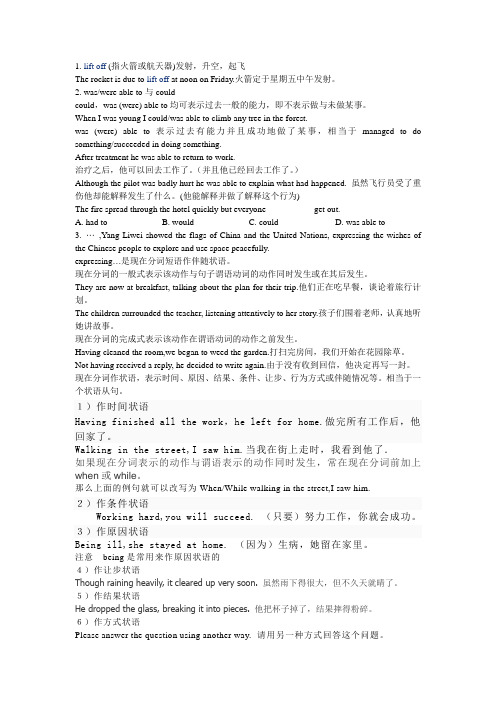
1. lift off (指火箭或航天器)发射,升空,起飞The rocket is due to lift off at noon on Friday.火箭定于星期五中午发射。
2. was/were able to与couldcould,was (were) able to均可表示过去一般的能力,即不表示做与未做某事。
When I was young I could/was able to climb any tree in the forest.was (were) able to表示过去有能力并且成功地做了某事,相当于managed to do something/succeeded in doing something.After treatment he was able to return to work.治疗之后,他可以回去工作了。
(并且他已经回去工作了。
)Although the pilot was badly hurt he was able to explain what had happened. 虽然飞行员受了重伤他却能解释发生了什么。
(他能解释并做了解释这个行为)The fire spread through the hotel quickly but everyone __________ get out.A. had toB. wouldC. couldD. was able to3.…,Yang Liwei showed the flags of China and the United Nations, expressing the wishes of the Chinese people to explore and use space peacefully.expressing…是现在分词短语作伴随状语。
现在分词的一般式表示该动作与句子谓语动词的动作同时发生或在其后发生。
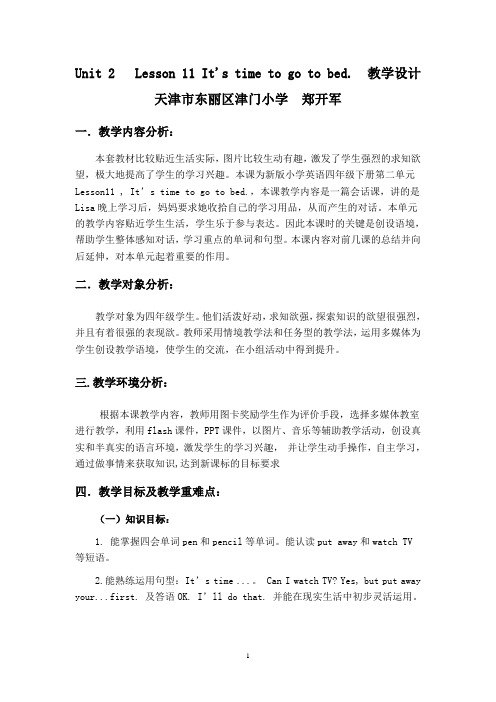
Unit 2 Lesson 11 It's time to go to bed. 教学设计天津市东丽区津门小学郑开军一.教学内容分析:本套教材比较贴近生活实际,图片比较生动有趣,激发了学生强烈的求知欲望,极大地提高了学生的学习兴趣。
本课为新版小学英语四年级下册第二单元Lesson11 , It’s time to go to bed.,本课教学内容是一篇会话课,讲的是Lisa晚上学习后,妈妈要求她收拾自己的学习用品,从而产生的对话。
本单元的教学内容贴近学生生活,学生乐于参与表达。
因此本课时的关键是创设语境,帮助学生整体感知对话,学习重点的单词和句型。
本课内容对前几课的总结并向后延伸,对本单元起着重要的作用。
二.教学对象分析:教学对象为四年级学生。
他们活泼好动,求知欲强,探索知识的欲望很强烈,并且有着很强的表现欲。
教师采用情境教学法和任务型的教学法,运用多媒体为学生创设教学语境,使学生的交流,在小组活动中得到提升。
三.教学环境分析:根据本课教学内容,教师用图卡奖励学生作为评价手段,选择多媒体教室进行教学,利用flash课件,PPT课件,以图片、音乐等辅助教学活动,创设真实和半真实的语言环境,激发学生的学习兴趣,并让学生动手操作,自主学习,通过做事情来获取知识,达到新课标的目标要求四.教学目标及教学重难点:(一)知识目标:1. 能掌握四会单词pen和pencil等单词。
能认读put away和watch TV等短语。
2.能熟练运用句型:It’s time ...。
Can I watch TV? Yes, but put away your...first. 及答语OK. I’ll do that. 并能在现实生活中初步灵活运用。
(二)能力目标:培养学生具有初步朗读和初步表演对话的能力,在真实的语境中灵活运用的能力。
(三)情感目标:培养学生积极与他人合作的精神。
养成良好的生活习惯,学会安排好自己的作息时间。
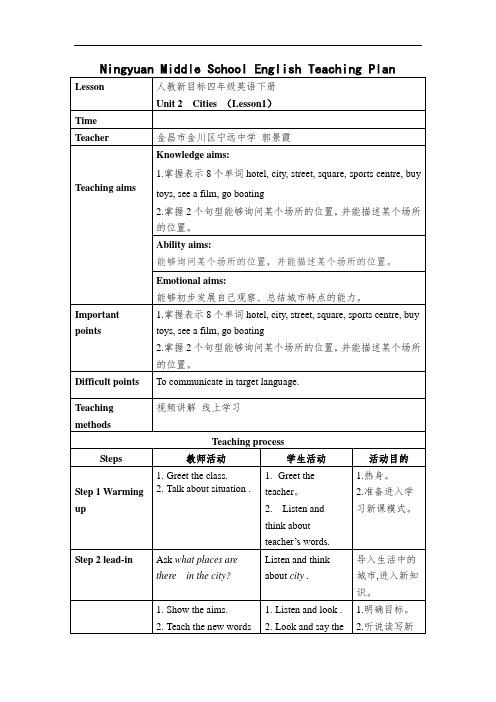

Lesson 11First listen and then answer the question.听录音,然后回答以下问题。
Who paid for Tony's dinner?I was having dinner at a restaurant when Tony Steele came in. Tony worked in a lawyer's office years ago, but he is now working at a bank. He gets a good salary, but he always borrows money from his friends and never pays it back. Tony saw me and came and sat at the same table. He has never borrowed money from me. While he was eating, I asked him to lend me twenty pounds. To my surprise, he gave me the money immediately. 'I have never borrowed any money from you,' Tony said, 'so now you can pay for my dinner!'参考译文我正在一家饭馆吃饭,托尼.斯蒂尔走了进来。
托尼曾在一家律师事务所工作,而现在正在一家银行上班。
他的薪水很高,但他却总是向朋友借钱,并且从来不还。
托尼看见了我,就走过来和我坐到一张桌子前。
他从未向我借过钱。
当他吃饭时,我提出向他借20英镑。
令我惊奇的是,他立刻把钱给了我。
“我还从未向你借过钱,”托尼说道,“所以现在你可以替我付饭钱了!”New words and expressions 生词和短语turn n. 行为,举止deserve v. 应得到,值得lawyer n. 律师bank n. 银行salary n. 工资immediately adv. 立刻★New words and expressions☆turn n.行为,举止“行为,举止”常用behaviorPay attention to your behavior.turn:对人有影响力的行为,很少用。
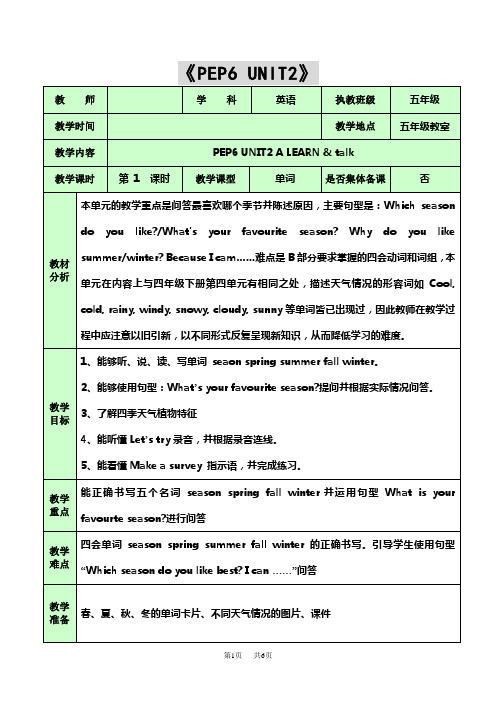
Unit 2 I’m more out going than my sister.-1一﹑学习目标1.掌握重点单词、短语和句型2.掌握比较级的变化规则3.会利用比较级进行简单的比较和表达二﹑重点与难点1.比较级的变化规则2.利用比较级进行简单的比较和表达三、自我预习:(一)形容词比较级的构成1.规则变化(1)单音节和少数多音节形容词比较级的构成:A.一般情况直接加er;tall—________ slow—________B.以e结尾的词加r;nice—________ brave—________C.以“辅音字母+y”结尾的词变y为i再在词尾加er;easy—_______ lazy—_____D.以一个辅音字母结尾的重读闭音节单词应双写辅音字母,再在词尾加er。
thin—_______ red—______ hot---_______(2)多音节词和部分双音节词要在形容词之前加上more。
interesting—more interesting famous—more famousathletic—— more athletic outgoing—— more outgoingserious—— more serious delicious—— more delicious2. 不规则变化某些形容词的比较级变化是不规则的。
well/good—better bad/ill—worse many/much—more little—less(二)形容词比较级的用法表示两者(人或物)之间的比较,要用形容词比较级,表示其中一个比另一个“更……”或“较…..”,后面用连词连接另一个所要比较的人或物。
在上下文明确的情况下,形容词比较级也可以单独使用。
eg. His room is brighter than mine.Which is newer ,your coat or mine?(三)形容词比较级的修饰语比较级可以不带修饰语,若表示程度或差别大小时,用much,a little,even,far,still或数词修饰。